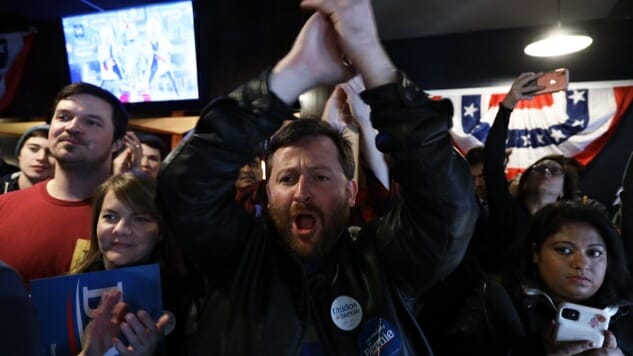What Does it Really Take to Win the Iowa Caucuses: Insights from a Former Iowa Democratic Party Leader
Photo by Alex Wong/Getty
The Iowa Caucuses are just hours away, and if you believe the polls, a tense evening beckons. The caucuses are a sometimes-mysterious, often-misunderstood process, and winning in Iowa requires a unique set of campaign strategies. One person who knows the intricacies of the Iowa Caucuses is my good friend Gordon Fischer, a Cedar Rapids attorney and a former Chair of the Iowa Democratic Party.
Gordon served as state party Chair during the 2004 Iowa Caucus campaign, when he was a party spokesperson and ambassador for the caucuses; he traveled all over Iowa to meet with local party officials and activists, and he has been an occasional national media commentator on politics for several years.
I don’t know of anyone who understands the Iowa Caucuses better than Gordon, and there’s no one more passionate about Iowa’s unique role in starting the process of choosing the next president. He has special insights into how the caucus process works, what the campaigns are trying to accomplish, and what it takes to win.
I spoke with Gordon about the 2020 Caucus race, which candidates might win, and the secret truths about Iowa that people from around the country might not understand.
What’s going on behind the scenes right now at the various campaign headquarters? What are the campaign staffers thinking right now?
If you’re working on a presidential campaign in Iowa, this is the time of freaking out. There’s not enough time to do everything that needs to be done. It’s like the week before a wedding, the week before a play opens, where you’re scrambling. Get that last undecided voter. Get out one last mailing, one last email blast, try to surge that final week. Everything your campaign has been building toward, now you’re trying to drive it home. Make sure your supporters show up on Caucus Night.
A lot of people who don’t live in Iowa or don’t follow politics closely might not know this, but it’s really crazy how long of a process the Iowa Caucus race really is. Some of the campaigns have been here for over a year already.
It’s true! The Iowa Caucus campaign is a yearlong process of building relationships with caucus-goers at the local level, down to the level of precincts. There are approximately 2,000 precincts in Iowa, and they all matter. It’s a small state, but it’s like 2,000 separate local elections happening on the same night.
The campaign tactics that seem to get the most attention are things like TV ads and campaign junk mail, but how important are TV ads in Iowa, compared to the ground game of organizing people and knocking on doors?
Obviously, things like TV ads can help boost a candidate’s name recognition and get the message out. But there’s really no shortcut to winning the Iowa caucuses. It’s not about money. Even with all the money that a candidate like Tom Steyer is spending, it’s not about money. The real secret to winning Iowa is the ground game: knocking doors, organizing, Get Out the Vote.
There’s a huge amount of retail politicking and one-on-one relationship building that happens during the campaign. And I say this with nothing but affection, but it’s kind of like “herding cats.” It’s a lot of time organizing, building relationships with local activists, having coffee with people who are influential with voters in their communities.
To win Iowa, you need to work hard, be present all over the state, and organize a great team, in all 2,000 precincts. You need to have a volunteer Precinct Captain in every precinct, staff in every precinct, supporters identified in every precinct. You can’t afford to ignore a wide swath of precincts, that would be a sure route to defeat. A precinct in the smallest town in Iowa matters just as much as a precinct in the capital city of Des Moines. At its best, it really is all about grassroots organizing and knocking doors and making phone calls and making person-to-person contact.
It seems like so often in the Iowa Caucuses, if you look back at previous years’ results, there are surprises. Some candidate does better than expected, someone surges in the last few days, another candidate fades down the stretch. What really drives turnout and causes these Caucus Night surprises?
When I look back at 2004, the last few days of the race were incredibly fluid. A week out from 2004, Howard Dean was still seen as a favorite, John Kerry had a lot of momentum and was kind of described as a comeback or surprise winner when he won Iowa, and then John Edwards was a huge wild card; no one saw that coming, he finished 2nd to John Kerry and he had strength in rural areas.
A big factor in 2004 that I think helped John Edwards was when the Des Moines Register endorsed him. The Des Moines Register just recently endorsed Elizabeth Warren for 2020; I don’t know that it will have the same level of impact as that endorsement had in 2004. The Register also endorsed Hillary Clinton in 2008, and a lot of Obama campaign people were discouraged about that at the time, but Obama still won Iowa in 2008.
Caucus night results can be driven by a lot of factors. It’s all about turnout; who shows up, who doesn’t show up, which areas of the state have higher or lower turnout than expected, even the weather can have an effect on the outcome.
Passion matters. Campaigns with the most enthusiastically committed supporters have an advantage over the candidates who are more casually committed. That’s because the Iowa Caucus is more of a time commitment; it’s not just showing up at the polls and casting a secret ballot, it’s sometimes two or three hours where you meet with your neighbors and stand up to be counted in a school gym or church basement. It’s just a different sort of situation.
And uncommitted caucus-goers and second- and third-choice candidates matter. Lots of people don’t make up their minds until late in the process, some candidates are not viable on caucus night, so their support goes to other candidates.
Based on your experience in 2004, what do you think about the state of the race for 2020?
I feel like here in 2020, Iowa is up for grabs. It feels almost like 4-way tie, depending on the polls. There are 4 candidates within a few percentage points of each other, and we just don’t know what’s going to happen. It comes down to campaign mechanics: who has the best on the ground organizations, who has built the best relationships in local precincts like “Precinct 34 in West Des Moines.”
The result will be affected by people’s second- and third-choice candidates. It’s going to be really fluid and fascinating to see how it turns out. I really think that only in retrospect will we be able to say, “Candidate X or Y had a better ground game or was waning or surging…”
Are you going to caucus? Have you committed to a candidate?
I’m going to caucus but I am genuinely uncommitted. Sometimes people in Iowa do that, we show up on caucus night uncommitted and we don’t choose who to support until we’re in the room on that night.
People get mad at me about being uncommitted! They’ll say to me, “Don’t you see that Candidate X is OBVIOUSLY the best candidate??” To me, the number one priority is beating Trump in November. And a rational person can make rational arguments for several different candidates who can beat Trump.
How do you feel about the outlook for November? Can Trump be beaten, or will he somehow escape from accountability once again?
Lots of people might not agree with this, but I feel like the Iowa Democratic Party is even more unified now than we were in 2004. I feel like there is a dynamic now where Democrats dislike Trump so much that there’s a feeling that the whole field of Democratic candidates are broadly acceptable to the party base, just because Trump is so uniquely awful. Democrats didn’t like George W. Bush in 2004, but the antipathy was nowhere near what it is for Trump. And rightly so.
I think the vast majority of Democrats are going to “Vote Blue No Matter Who” in November, but I also think Democrats need to be careful not to attack each other, not to tear each other down, not to create hard feelings that could linger into the general election.
I don’t think Trump can “win,” but if we’re not careful, the Democrats can “lose.” If the Democrats stay unified, Trump loses. Trump has a low ceiling for 2020! A huge percentage of voters already don’t want to vote for Trump. And it’s kind of amazing that Trump is so unpopular, because any other person in the White House in his situation would be comfortably on track for re-election.
If you step back and look at it, the economy is pretty good, we’ve had some saber-rattling in the Middle East but it’s nowhere near Vietnam 1968 or Iraq 2006. And yet, even with all the factors that should be supportive of an incumbent president, close to a majority of people are already saying that they will NOT vote for Trump. The trade wars have not helped, we have this ridiculously enormous deficit fueled by tax cuts for the wealthy…Trump is definitely vulnerable, and Democrats can win in November. Hopefully the Iowa Caucus result will be the first step toward the end of Trump’s presidency.







































